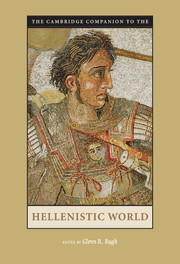Book contents
- Frontmatter
- Introduction
- 1 Alexander the Great and the Creation of the Hellenistic Age
- 2 The Hellenistic Kingdoms
- 3 The Polis and Federalism
- 4 Hellenistic Economies
- 5 The Hellenistic Family
- 6 History and Rhetoric
- 7 Material Culture
- 8 Hellenistic Art: Two Dozen Innovations
- 9 Language and Literature
- 10 Greek Religion: Continuity and Change in the Hellenistic Period
- 11 Philosophy for Life
- 12 Science, Medicine, and Technology
- 13 Hellenistic Military Developments
- 14 Greeks and Non-Greeks
- 15 Recent Trends and New Directions
- Hellenistic Dynasties
- Works Cited
- Index
2 - The Hellenistic Kingdoms
Published online by Cambridge University Press: 28 November 2007
- Frontmatter
- Introduction
- 1 Alexander the Great and the Creation of the Hellenistic Age
- 2 The Hellenistic Kingdoms
- 3 The Polis and Federalism
- 4 Hellenistic Economies
- 5 The Hellenistic Family
- 6 History and Rhetoric
- 7 Material Culture
- 8 Hellenistic Art: Two Dozen Innovations
- 9 Language and Literature
- 10 Greek Religion: Continuity and Change in the Hellenistic Period
- 11 Philosophy for Life
- 12 Science, Medicine, and Technology
- 13 Hellenistic Military Developments
- 14 Greeks and Non-Greeks
- 15 Recent Trends and New Directions
- Hellenistic Dynasties
- Works Cited
- Index
Summary
Introduction
The emergence of the major states in the Hellenistic World was the result of a complicated series of events, a mixture of various traditions, and the existence of some very forceful personalities. All of these combined to make Hellenistic kingship, as well as the kingdoms themselves, unique. The most influential personality, even in death, was that of Alexander the Great, and he left his mark on all the kingdoms. But the strength of the personalities among the Successors (Diadochoi) was equally distinct. A generation and a half of almost-constant civil war among the Macedonian Successors to Alexander provided the context in which these kingdoms were formed. Finally, in each kingdom, the traditions of the native peoples and their natural resources made a mark on that development as well. Many of the aspects of Hellenistic kingship were passed on to the Romans, along with the religious and cultural heritage of the Hellenistic World, to be adapted and find its culmination in Roman imperial culture.
The Aftermath of Alexander’s Death
When Alexander the Great died in Babylon in June 323 b.c.,1 he left behind more questions than he had resolved. Worse, he had failed to provide for any succession. Over the previous year, half of the twenty provincial governors (satraps) had either already been executed for treason and malfeasance or were awaiting that fate, which hamstrung the normal machinery of government. The leading figures of the last decade were all gone, dead from the strains and conditions of the campaigns themselves or executed in the intrigues of court politics.
- Type
- Chapter
- Information
- The Cambridge Companion to the Hellenistic World , pp. 28 - 51Publisher: Cambridge University PressPrint publication year: 2006
- 6
- Cited by



